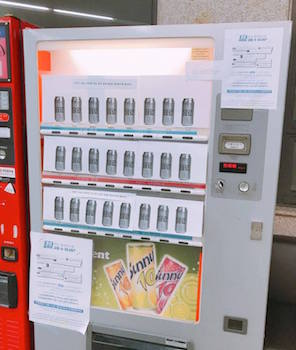Experiencing visual impairment through beverage cans

For the visually impaired, most beverage cans remain “nameless.” This means that about 250 thousand people, just in Korea, are forced to ask a passerby “What is this drink?” every time they shop in a supermarket or stand in front of a vending machine.
The reason for this inconvenience is that although canned beverages do have braille on them, it does not specify them as ‘Coke’ or ‘cider,’ but just says ‘drink.’ To a visually impaired person, a single canned drink could be anything from canned coffee to peach-flavored soda. To choose one in mind, you would have to ask someone else if what you are holding is actually your favorite brand of grape juice. Mostly, you would just drink whatever clunks out of the vending machine.
“Most people fail to realize this huge inconvenience for visually impaired people because we have seen cans with something written in Braille,” said Hwang Ji-soo, a member of Seoul Women’s University’s student club Hun-mang-jeongeum, who first planned this project. “But most don’t know that it says ‘drink’ instead of the actual name of the beverage.”
In commemoration of Korean Braille Day on Nov. 4, club members covered vending machines on campus with pictures of beverage cans without names. The pictures only had “drink” written on them. By doing so, they hoped that students would experience the discomfort that the visually impaired face when choosing a drink and become more aware of the special needs.
The school’s disability rights activist club Searcheye participated and covered vending machines in Ewha-POSCO, Student Union, and Science Building on Nov. 3.
“I think it’s a very good and effective idea. The vending machines drew a lot of attention from students in the building,” said Kim Ye-ji, a freshman from Division of Christian Studies. “Before reading the notice, I didn’t realize that even the most trivial things like choosing a drink could be a huge obstacle. We really need to pay more attention to the social minorities in our country.”
The project has gained attention and participation from student groups of not only Ewha but other schools, such as Disability Rights Union from Konkuk University, Guernica from Yonsei University, Atti from Myongji University, and Iruda-an from Sookmyung Women’s University.
“Through this project, we hope more students experience how it feels to be denied one’s right of choice, and learn about the hardships of visual impairment,” Hwang said.
For the past few years, there have been more movements to protect the visually impaired’s right of choice. Since 2015, KORAIL Retail has been attaching braille stickers with specific beverage names on its two thousand vending machines in KTX and Seoul Subway Line 1. This year, Lotte Chilsung announced that it will print “carbonated” in braille for their fizzy drinks to distinguish them from other beverages.
However, many companies still hesitate to provide different braille marks for beverage cans due to price issues. They say punching different messages on cans require separate process for various drinks, and the additional price becomes a burden for the producers.
“We do not believe that disability is a problem an individual has to overcome. It is a structural problem of the society that has failed to provide a convenient environment for people with ‘different abilities,’” Hwang said. “That is exactly why we are trying to raise awareness on this matter. Right now, companies are refraining from providing diverse braille on their beverages due to price issues, but if more and more people call for the recognition of disability rights, I think the companies would follow.”

